 |
 |
 |
 |
 |
 |
| |
 |
|
 |
 |
 |
  |
  |
 |
 |
 |
 |
|
|
 |
|
 |
 |
 |
BUILDING |
 |
|
 |
|
 |
 |
 |
| |
 |
| 
 |
Stazione Alta Velocità Torino Porta Susa
Turin Porta Susa high speed train station |
|
 |
 |
 |
 |
DESIGNER |
 |
|
|
 |
|
 |
 |
 |
| |
 |
|
 |
 |
 |
 |
CONTEXT |
 |
|
|
 |
|
 |
 |
 |
| Relationship with the location |
 |
|
 |
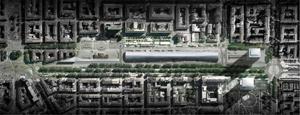 Work on Torino Porta Susa railway station, the first Italian station on the high speed Paris-Rome line, resumed at the end of 2009. The gateway into Italy from northern Europe, Torino Porta Susa is designed as an urban locus, an extension of the city’s existing Roman layout and public spaces, offering a wide range of transport and services. The station is an extensive hub where travellers can change easily from one mode of transport – high speed train, regional train, metro, bus, tram, car or two-wheeled vehicle – to another. It is also a centre of services and shops for commuters and local residents. Work on Torino Porta Susa railway station, the first Italian station on the high speed Paris-Rome line, resumed at the end of 2009. The gateway into Italy from northern Europe, Torino Porta Susa is designed as an urban locus, an extension of the city’s existing Roman layout and public spaces, offering a wide range of transport and services. The station is an extensive hub where travellers can change easily from one mode of transport – high speed train, regional train, metro, bus, tram, car or two-wheeled vehicle – to another. It is also a centre of services and shops for commuters and local residents. |
|
 |
 |
 |
 |
 |
 |
 |
DESCRIPTION |
 |
|
|
 |
|
 |
 |
 |
| Concept |
 |
|
 |
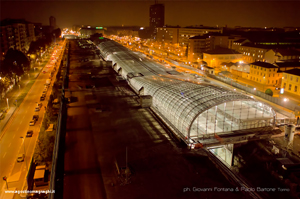 Located between the Spina (the long boulevard crossing Turin from north to south on the site of former railway lines) and the Corso Bolzano, the station is in the form of a long gallery. It is covered by an imposing glass canopy, 385 metres long and 30 metres wide, which is joined perpendicularly at 100-metre intervals by walkways positioned in line with existing streets. Located between the Spina (the long boulevard crossing Turin from north to south on the site of former railway lines) and the Corso Bolzano, the station is in the form of a long gallery. It is covered by an imposing glass canopy, 385 metres long and 30 metres wide, which is joined perpendicularly at 100-metre intervals by walkways positioned in line with existing streets.
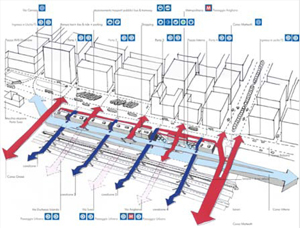 Visitors enter the gallery at these points through large vertical openings in the glass gallery, each protected by a wide canopy. Inside the gallery is a series of volumes in steel and glass, housing services and shops. They rest on a two-level concrete base occupied by car parks and technical areas. Visitors enter the gallery at these points through large vertical openings in the glass gallery, each protected by a wide canopy. Inside the gallery is a series of volumes in steel and glass, housing services and shops. They rest on a two-level concrete base occupied by car parks and technical areas. |
|
 |
 |
 |
|
 |
|
| The City enters the Station |
 |
|
 |
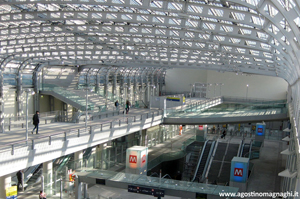 A real street in itself, the covered gallery is bounded to the south by a public amenity tower and to the north by a sloping esplanade linking it to the historic city and the old station (which comprised only a passenger hall). Despite the differences in ground level from north to south and between the Corso Bolzano and the Spina, travellers using the new station move easily and smoothly between the five levels, by means of a gently sloping ramp, escalators, staircases and lifts. A real street in itself, the covered gallery is bounded to the south by a public amenity tower and to the north by a sloping esplanade linking it to the historic city and the old station (which comprised only a passenger hall). Despite the differences in ground level from north to south and between the Corso Bolzano and the Spina, travellers using the new station move easily and smoothly between the five levels, by means of a gently sloping ramp, escalators, staircases and lifts.
- Four calvalconi walkways (in blue, at 100-metre intervals) connect the passenger concourse (level -1) and the platforms below (level -3).
- Five walkways (in red) allow visitors to cross the gallery from east to west. |
|
 |
 |
 |
|
 |
|
| An Urban Gallery |
 |
|
 |
 Both an intermodal terminal and an urban locus, Torino Porta Susa station is a highly innovative project in the world of rail transport. It integrates all the requirements of an interchange hub in a new and resolutely contemporary city space: the city enters the station and the station becomes a piece of the city. Both an intermodal terminal and an urban locus, Torino Porta Susa station is a highly innovative project in the world of rail transport. It integrates all the requirements of an interchange hub in a new and resolutely contemporary city space: the city enters the station and the station becomes a piece of the city.
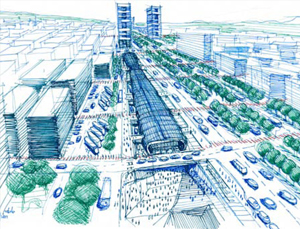 It can also be seen as a continuation of the urban style of Italy’s great 19th-century city arcades (Galleria San Federico in Turin, Galleria Umberto I in Naples, Galleria Vittorio Emanuele II in Milan), and of the great concourses of Europe’s 19th-century railway stations. It can also be seen as a continuation of the urban style of Italy’s great 19th-century city arcades (Galleria San Federico in Turin, Galleria Umberto I in Naples, Galleria Vittorio Emanuele II in Milan), and of the great concourses of Europe’s 19th-century railway stations. |
|
 |
 |
 |
|
 |
|
| . |
 |
|
 |
|
 |
 |
 |
 |
 |
 |
 |
ECO-SUSTAINABILITY |
 |
|
|
 |
|
 |
 |
 |
|
|
 |
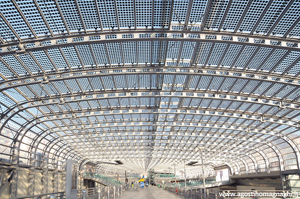 The skin of the glass roof (15,000 square metres) is entirely covered in single-crystal photovoltaic sensors positioned between the two layers of glass. They also act as shading devices, optimizing the comfort of people using this public space in summer and winter alike. Energy production is 680,000 kWh per year. The whole volume is ventilated naturally – from the platforms, which have high inertia, to the main hall, which is more open to the exterior. The skin of the glass roof (15,000 square metres) is entirely covered in single-crystal photovoltaic sensors positioned between the two layers of glass. They also act as shading devices, optimizing the comfort of people using this public space in summer and winter alike. Energy production is 680,000 kWh per year. The whole volume is ventilated naturally – from the platforms, which have high inertia, to the main hall, which is more open to the exterior.
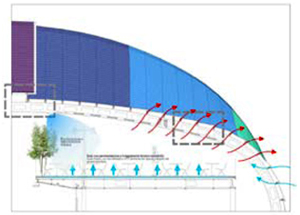 The station is temperature-controlled in winter and summer. The station is temperature-controlled in winter and summer.
Abundant vegetation in the station’s interior spaces provides additional shade and a sensation of coolness. |
|
 |
 |
 |
 |
 |
 |
 |
LOCATION |
 |
|
|
 |
|
 |
 |
 |

|
 |

|
Continent |
|
 |
|
Nation |
|
 |
|
Region |
|
 |
|
Province |
|
 |
|
Town |
|
 |
|
Address |
|
 |
|
|
|
 |
|
 |
 |
 |
 |
MAP |
 |
|
|
 |
|
 |
 |
 |
| |
 |
|
 |
 |
 |
 |
|
TYPOLOGY |
 |
|
|
 |
|
 |
 |
 |
Main |
 |
|
 |
ARCHITECTURE | Transport buildings and structures
Railway stations
|
TOWN PLANNING AND URBAN DESIGN | Transport and road system infrastructures
Interchanges
| |
|
|
 |
|
Additional |
 |
|
 |
ARCHITECTURE | Commercial buildings
Shops
Urban equipment and structures for public areas
Streets and squares
| |
 |
 |
 |
 |
CHRONOLOGY |
 |
|
|
 |
|
 |
 |
 |
Project |
 |
|
 |
| 
 |
2001 - 2002
|
|
Realisation |
 |
|
 |
| 
 |
2006 - 2013 |
|
 |
 |
 |
 |
AWARDS |
 |
|
|
 |
|
 |
 |
 |
| 2013 |
 |
|
 |
| European Steel Design Award |
|
 |
 |
 |
|
 |
|
| 2013 |
 |
|
 |
Large Rail Station of the Year
European Rail Awards |
|
 |
 |
 |
|
 |
|
| 2012 |
 |
|
 |
|
 |
 |
 |
 |
 |
 |
 |
BIBILIOGRAPHIC REFERENCES |
 |
|
|
 |
|
 |
 |
 |
|
 |
| David Cohn, "Porta Susa high-speed train station, Turin, Italy", Architectural Record 8/2014, august 2014 [Transportation], pp. 109-113 |
|
|
Margot Guislain, "Nouvelles gares en Europe / New rail stations n Europe", Moniteur Architecture AMC 214, avril/april 2012, pp. 65-75
"Porta Susa, Turin", Moniteur Architecture AMC 214, avril/april 2012, p. 69 (65-75) |
|
|
| "Gare de Turin, Porta Susa, Italie / Porta Susa Station, Turin", Architecture Mediterraneenne 59, juin/june 2009, pp. 74-76 |
|
|
| Eleonora Capelli, "L'Europa va in carrozza / Europe by Train", Ottagono 167, febbraio/february 2004, pp. 78-79 (70-87) |
|
|
Filippo De Pieri, "L'alta velocità avanti piano", Il giornale dell'architettura 14, gennaio 2004, "Inchieste" p. 3 (3-5)
"La nuova stagione delle stazioni ferroviarie", Il giornale dell'architettura 14, gennaio 2004, "Inchieste" p. 3 (3-5) |
|
|
| Il nodo urbano / The Urban Link, supplemento a/supplement of l'Arca 187, dicembre/december 2003 |
|
|
| "Nuova Stazione Porta Susa di Torino", Casabella 715, ottobre/october 2003, "Architettura_e tecnologie per le grandi stazioni" |
|
|
| Michele Bazan Giordano, "Torino dinamica / Porta Susa Station", L'Arca 172, luglio-agosto/july-august 2002, pp. 22-25 |
|
 |
 |
 |
 |
 |
 |
 |
CLIENT |
 |
|
|
 |
|
 |
 |
 |
| |
 |
RFI Rete Ferroviaria Italiana spa
TAV (Treno Alta Velocità spa) |
|
 |
 |
 |
 |
AMOUNT |
 |
|
|
 |
|
 |
 |
 |
| |
 |
|
 |
 |
 |
 |
DIMENSIONAL
DATA |
 |
|
|
 |
|
 |
 |
 |
| Lenght |
 |
|
 |
|
| Surface |
 |
|
 |
|
 |
 |
 |
 |
STRUCTURES |
 |
|
|
 |
|
 |
 |
 |
| |
 |
|
 |
 |
 |
 |
STAFF |
 |
|
|
 |
|
 |
 |
 |
Project  |
 |
AREP
Jean-Marie Duthilleul, Étienne Tricaud |
|
|
 |
|
Associate designers  |
 |
| Silvio D'Ascia, Agostino Magnaghi |
|
|
 |
|
Design team |
 |
| B. Banwarth, S. Barracco, M. Boenders, R. Camarda, M. Camassi, M. Chazelle, P. Coppola, A. Coullez, A. Delarbre, D. Dorell, E. Dussiot, F. Ferrara, S. Genco, P. Holstein, A. Joineau, L. Lafourcade, L. Neouze, F. Levêque, J. Lomessy, I. Magnaghi, T. Manco, M. Massault, L. Moschella, S. Murr, M. Pihouée, M. Rubino, A. Ruiz Gomez, A. Rocca, E. Vigliocco |
|
Coordination |
 |
|
Structural consultant |
 |
SI.ME.TE. – Ing. C. Piantino (concrete structures)
MAP 3 (metal structures) |
|
Hydraulic engineer |
 |
|
Electrical engineer |
 |
|
Construction supervision |
 |
F. Nicolosi, E. Seif, A. Milano, S. Aureli, G. Perino
Silvio D'Ascia Architecture |
|
Fire safety |
 |
|
Metric calculation |
 |
|
 |
 |
 |
 |
CREDITS |
 |
|
|
 |
|
 |
 |
 |
| |
 |
Photos © AREP, Agostino Magnaghi, Giovanni Fontana & Paolo Bartone
Drawings © AREP
Text edited by AREP
Courtesy of AREP, Arch. Agostino Magnaghi
|
|
 |
  |
 |
|
|